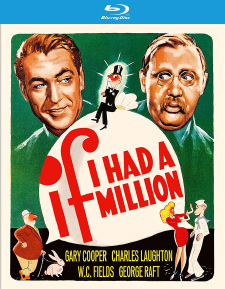If I Had a Million (Blu-ray Review)

Director
VariousRelease Date(s)
1932 (March 28, 2023)Studio(s)
Paramount Pictures (Kino Lorber Studio Classics)- Film/Program Grade: A-
- Video Grade: A
- Audio Grade: A-
- Extras Grade: B
Review
A mostly satisfying all-star anthology film from Paramount, If I Had a Million (1932) deviates from most such pictures. The vast majority concentrate on one genre, horror particularly (Dead of Night, Tales from the Crypt, etc.), have one director, and each segment is approximately the same length. If I Had a Million’s segments vary widely in length and genre, and were turned out by seven different directors (see above). As usual with such portmanteau, the impact of the strongest segments is diminished somewhat by the weaker ones, but in this case even the entirely predictable ones are generally satisfying.
The premise, quite similar to the later, popular 1950s TV series The Millionaire, has dying multimillionaire John Glidden (Richard Bennett, later Major Amberson in Welles’s The Magnificent Ambersons) refusing to leave his estate to greedy relatives or trust his industrial holdings to incompetent employees, and so he randomly selects strangers out of the phone book, giving each a certified check for $1 million.
The two most celebrated segments are Road Hogs, directed by Norman Z. McLeod and starring W.C. Fields and Alison Skipworth (her first of three films opposite Fields); and The Clerk, starring Charles Laughton directed by Ernst Lubitsch. Road Hogs is typical of the film’s set-up: ex-vaudevillians Emily and Rollo LaRue are retired from the show business, she running a small tea room. They’ve scrimped and saved their meager income to buy a new car, which is promptly wrecked by a careless driver who ignores a stop signal. Upon receiving Glidden’s million-dollar check, the couple buys a fleet of used cars, gleefully looking for inconsiderate motorists to spectacularly crash into and run off the road. (This, clearly, is one wish-fulfillment fantasy that hasn’t dated.) Though predictable, Fields’s dialogue, probably written or tweaked by Fields himself, is quite hilarious.
Lubitsch’s segment with Laughton is no more than a few minutes long, has almost no dialogue, and built entirely around a single laugh (also still relevant) which I won’t spoil here. It’s a little gem that, despite its brevity, emblematically bears the Lubitsch touch.
The other segments are variable but all are worthwhile and interesting. One almost never praised in reviews that I liked enormously was another short-and-sweet segment called Violet, directed by Stephen Roberts (The Story of Temple Drake). Wynne Gibson plays the title character, a barroom prostitute who, upon receiving her million bucks, checks into the swankiest room at the swankiest hotel in town. Alone, she tosses one of the two pillows off the huge bed, strips in the pre-Code Hollywood manner and climbs in, reveling in a solitude almost unknown to her. And that’s all there is to this understated, unexpectedly touching segment.
The only vignette no one seems to like at all is Death Cell, directed by James Cruze and starring Gene Raymond as a convicted felon who receives his million-dollar check literally on his way to the electric chair. Reviewers and audiences in 1932 were shocked by the grim irony in what was mostly a lighthearted film, while Raymond’s early-‘30s theatricality seems merely hammy to modern audiences. That didn’t bother this reviewer so much, however, and I rather liked it.
On the other hand, the movie errs in denying too many intended recipients—in three of the seven segments—the chance to enjoy their millionaire status. In The Three Marines, for instance, directed by William A. Seiter, buddies Gallagher (Gary Cooper), Mulligan (Jack Oakie), and O’Brien (Roscoe Karns) are stockade regulars, and when Gallagher is given one of the prized checks, he’s convinced it’s an April Fool’s gag. In The Forger, directed by H. Bruce Humberstone, Eddie Jackson (George Raft, as usual first seen flipping that signature coin) has a check he can’t cash anywhere because he’s wanted on a forging rap.
Predictability is another minor issue: In China Shop, directed by McLeod, Charlie Ruggles is a salesman stressed out by the money regularly taken out of his paycheck for the pricey chinaware he frequently knocks over, while at home his shrewish wife berates him for this lost income. So whattya think he’s going to do with his million? (Amusingly, Ruggles, who later became famous to new generations as the narrator of Fractured Fairy Tales on Rocky and His Friends, plays a character named Mr. Peabody while his boss is named Bullwinkle.)
At least three additional segments were initially planned, partly cast, and perhaps even partly shot before being abandoned. This was a wise decision, as the film maintains a brisk pace—always difficult with anthology pictures—and never wears out its welcome.
If I Had a Million is presented in its original 1.37:1 standard, black-and-white, in what appears to be an older but excellent HD transfer. (Unlike most recent titles licensed from Universal, this one is preceded by that company’s logo prior to Paramount’s.) The image is impressively sharp with excellent blacks and contrast. The DTS-HD Master Audio (2.0 mono) is also above average, and supported by optional English subtitles. Region “A” encoded.
Included is a trailer (2:44) and a new audio commentary track with historian/filmmaker Daniel Kremer and filmmaker Allan Arkush. Kremer sounds like he’s in a studio talking with Arkush on the telephone or via Zoom, so technically it’s a little awkward, but their conversation is flush with enthusiasm and interesting, informed observations.
If I Had a Million is an anthology with several real gems and no truly bad segments. Though uneven like all such films, this is definitely one of the more successful films of this type and still quite enjoyable.
- Stuart Galbraith IV

